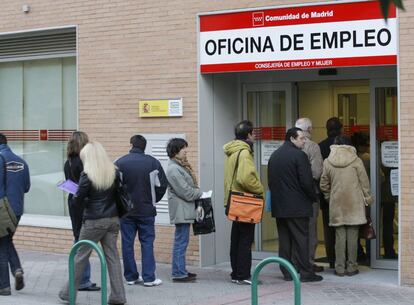Government’s star plan to help Spanish jobless falls far short of goals
Only 15% of allocated funds have been spent, and just 25% of potential beneficiaries are collecting checks

The Spanish government’s star initiative to help the long-term unemployed has fallen significantly short of its goals.
Only slightly over 25% of all estimated potential beneficiaries – 105,500 out of 400,000 – are collecting the monthly check for €426.
And although the government appropriated €1.2 billion for the project, only €182 million has been spent ahead of the end of the program on April 15, according to Labor Ministry figures.
The Labor Ministry is not offering any explanations for the plan’s poor performance
The Employment Activation Plan was the only major initiative of the past political term to enjoy broad consensus from social agents. The UGT and CCOO labor unions, the CEOE and Cepyme employer associations, and Labor Minister Fátima Báñez signed the agreement in December 2014 in the presence of Prime Minister Mariano Rajoy.
In theory, it was to be a stepping stone to a more ambitious plan: the reorganization of all the various state, regional and local subsidies in order to make the system more efficient.
But the program, which began on January 15, 2015, has failed to meet its own goals. Barely 15% of the allocated budget has been spent, and only 105,544 people are benefiting from it. Data also shows that only 14,000 participants, who collected the check for six months, went on to rejoin the job market.
The program was fraught with problems from the beginning. The public employment services originally restricted eligibility to individuals who had previously collected all other existing unemployment subsidies, in a bid to make the check a last-resort option.
The unions complained, and the government backtracked. But of the 52,135 applications that were turned down, around 20% were still rejected for that reason.
“The only explanation I can find is that [the government] had no interest in actually spending the allocated credit,” says Carlos Bravo, head of public policies at the CCOO labor union. In other words, the political will was missing.
The only explanation I can find is that the government had no interest in actually spending the allocated credit
Carlos Bravo, CC OO union
His colleague at UGT, Mari Carmen Barrera, feels the same way: “It is the result of a policy. If this government’s first step was to fire the 2,000 job counselors who were hired by the previous government, it means that it doesn’t believe in these types of measures.”
Both experts note that the Labor Ministry repeatedly ignored their suggestion that potential beneficiaries of the plan should be sent a letter with information.
Two weeks ago, the unions asked for an extension to the program and requested a meeting with the government. So far, only the second request has been granted, although the meeting will not take place until “a couple of weeks from now,” according to sources in the executive.
The Labor Ministry is not offering any explanations for the plan’s poor performance, and said it has asked regional governments – in charge of implementing employment policies – to come up with their own assessments.
There are nearly two million people in Spain who are out of a job and not collecting any unemployment benefits, according to state employment agency SEPE. The National Statistics Institute’s Active Population Survey (EPA) puts this figure at 3.5 million.
English version by Susana Urra.
Tu suscripción se está usando en otro dispositivo
¿Quieres añadir otro usuario a tu suscripción?
Si continúas leyendo en este dispositivo, no se podrá leer en el otro.
FlechaTu suscripción se está usando en otro dispositivo y solo puedes acceder a EL PAÍS desde un dispositivo a la vez.
Si quieres compartir tu cuenta, cambia tu suscripción a la modalidad Premium, así podrás añadir otro usuario. Cada uno accederá con su propia cuenta de email, lo que os permitirá personalizar vuestra experiencia en EL PAÍS.
¿Tienes una suscripción de empresa? Accede aquí para contratar más cuentas.
En el caso de no saber quién está usando tu cuenta, te recomendamos cambiar tu contraseña aquí.
Si decides continuar compartiendo tu cuenta, este mensaje se mostrará en tu dispositivo y en el de la otra persona que está usando tu cuenta de forma indefinida, afectando a tu experiencia de lectura. Puedes consultar aquí los términos y condiciones de la suscripción digital.









































